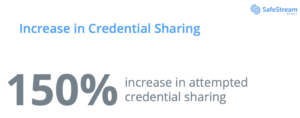
CPS 2020: SHIFT Shares Piracy Concerns with Loss of Theatrical Window
For all the pro-and-con discussions around major studios releasing their new films on digital outlets first, one problem flying under the radar is the potential for that content to be stolen.
“There’s obviously a massive risk of piracy,” Eric Wynalek, VP of strategic initiatives for SHIFT, said during a presentation — “Anti-Piracy Now and Later” — at the Dec. 8 virtual Content Protection Summit. “When Mulan was released earlier in the year on Disney+ it was one of the most sought-after titles for piracy.
“It’s obviously a very different world, with these international releases being released in different ways on SVOD services, and the continuing fracture of subscription video services. That will only continue to drive growth on the piracy side.”
 Wynalek used his presentation to not only share what SHIFT has seen on the piracy front in 2020, but also to offer Summit attendees insights into what other piracy observers have witnessed. They shared pre- and post-COVID-19 consumption data, looked at how and what viewers are consuming using both legal and illegal services, and provided takeaways on what to do with this data.
Wynalek used his presentation to not only share what SHIFT has seen on the piracy front in 2020, but also to offer Summit attendees insights into what other piracy observers have witnessed. They shared pre- and post-COVID-19 consumption data, looked at how and what viewers are consuming using both legal and illegal services, and provided takeaways on what to do with this data.
In 2020, SHIFT has noted a 71 percent increase in minutes of content watermarked vs. 2019, and a 150 percent jump in attempted credential sharing among streaming subscribers. “It makes a lot of sense just because of the jump in overall streaming because people have stayed home this year,” Wynalek said.
Olga Kornienko, co-founder and COO of EZDRM, shared details on what her firm saw in 2020 on the legal consumption side, with a more than 60 percent increase in the rate of licensed content delivery in 2020, compared to the year before, and a more than 200 percent increase demand for DRM services in 2020.
“If you think about who’s consuming this and where this content comes from … the consumption rate was similar with 2018 and 2019, and then in 2020 it jumps,” she said. “In April, when people realized they were going to be stuck in quarantine for quite some time, legal content consumption doubled.”
Andy Chatterley, CEO of content protection and piracy data firm MUSO, shared data showing that there was “a very quick drop-off” in piracy consumption of films once lockdowns began, something he attributed to “there just weren’t the new releases coming out,” he said.
 Americans still pirated a lot of content during the first nine months of the year, ranking second only behind India in terms of total piracy site visits (Turkey, China and Brazil rounded out the top five).
Americans still pirated a lot of content during the first nine months of the year, ranking second only behind India in terms of total piracy site visits (Turkey, China and Brazil rounded out the top five).
To view the full presentation, click here. To view the presentation slide deck, click here.
Presented by Microsoft Azure, the Content Protection Summit was sponsored by SHIFT, Genpact, Akamai, Convergent Risks, Friend MTS, GeoGuard, PacketFabric, Palo Alto Networks, Richey May Technology Solutions, Splunk, Zixi, EIDR, Cyberhaven and Xcapism Learning.
The event was produced by MESA, CDSA, the Hollywood IT Society (HITS) and Women in Technology Hollywood (WiTH), under the direction of the CDSA Board of Directors and content advisors representing Amazon Studios, Adobe, Paramount, BBC Studios, NBCUniversal, Lionsgate, WarnerMedia, Amblin Entertainment, Legendary Pictures, and Lego Group.
